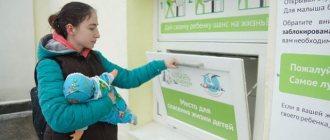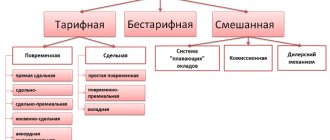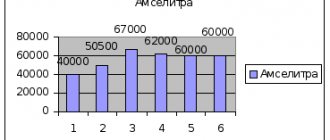Peculiarities
The Family Code establishes the obligation of parents/adoptive parents, guardians (legal representatives) to live together with young children (age from 0 to 13).
The baby's home is where his dad and mom live. However, this does not mean that the minor becomes the owner of the apartment. The right to free residence is based on the actual provision of housing to the child.
Important! If the baby's mother or father ceases to be members of the family of the apartment owner or tenant, they lose the right to live in this living space free of charge.
Example: Oksana and Evgeniy registered their marriage. At the same time, the wife had a daughter, Irina, from her first husband. E. registered them in the apartment, the owner of which he was. 2 years later, Irina gave birth to a son, Maxim, and also registered him in her stepfather’s house. A year later, Oksana and Evgeniy divorced. Irina and Maxim are no longer members of E.’s family, and can be discharged from their occupied living space in court without the consent of the young mother.
A citizen registered in the owner’s apartment can register his child there without the owner’s consent. After which, the law prohibits the discharge of only a minor.
If they remain registered in the apartment, eviction is possible only through a judicial procedure.
When concluding a rental agreement for residential premises in the name of the parent, the child acquires the right to live in the apartment on the basis of actual provision. It does not matter whether it is included in the contract or not.
A minor who has reached 14 years of age may live separately from his parents or adoptive parents.
For example, with a grandmother or other relatives. The opinion of mom and dad is not decisive.
Deprivation of parental rights does not affect the ability of a minor to live in the living space of his father and mother.
The ward receives the right to live separately from the guardian upon reaching 16 years of age, with the permission of the guardianship and trusteeship authority to live separately from a legal representative.
Let's summarize:
- children's housing rights are based on similar rights of parents;
- by acquiring the opportunity to live, the baby does not become the owner of the apartment of his mother, father or adoptive parents;
- parents/adoptive parents do not have similar rights to children's homes.
Violation of housing rights
Every citizen of the Russian Federation from birth has a set of rights that are regulated and protected by the current legislative acts of the Russian Federation. Housing human rights: the right to housing, the right to acquire property, the right to use and live in residential premises, etc., are enshrined in the main document - the Housing Code of the Russian Federation. Unfortunately, there are often situations when the housing rights of not only an adult are infringed, but also the housing rights of a child are violated. This manifests itself in the following:
- - and etc.
- - illegal eviction of a child;
- - refusal to provide them with living space;
- — violation of children’s housing rights as a result of deterioration of their living conditions;
of minor children is also manifested in the following: registration of real estate transactions in such a way that the child ends up without an apartment, literally thrown out onto the street.
According to this, in the event of dissolution of the marriage relationship with the owner of the apartment, the right to use the residential premises is terminated for all former family members, including the child. However, the legislation tries to protect the rights of the child. According to the same article, if a former family member does not have other housing, then, based on a court decision, he is allowed to use the residential premises until a certain period of time.
The length of stay in this apartment is determined by the court. Responsibility for violation of housing rights lies not only with the parents of the child himself, but also with government authorities.
Guardianship and trusteeship authorities and municipal structures are obliged to monitor any violations of the child’s housing rights and seek their restoration. 07.27.2021 - Olga Polyakova The ex-husband discharged himself and discharged our child (8 years old) to nowhere without a trial or permission from the guardianship authorities from a municipal apartment, and for unknown reasons, the rest of the relatives, including children under 14 years old, except the mother-in-law, were discharged!! ! If they want to privatize and sell the apartment, my son has the right to privatize the apartment. As an ex-wife, I am registered in another apartment.
The child is not the owner of the apartment
The housing rights of minors who are not home owners are derived from the rights of legal representatives. Moreover, if a child has two parents, guardians or adoptive parents, he has the right to live in the residential premises of each of them.
The law provides for the appointment of 2 guardians in exceptional cases. At the same time, guardianship authorities must distribute responsibility for observing the rights of the ward between them. It can be separately agreed upon which of them the baby will live with. However, the right to live in the apartment of another guardian arises in any case.
Important! If only a child is registered in the residential premises, for example, the parents/adoptive parents have died, this is not grounds for termination of his housing rights.
The right to live in mom and dad’s apartment is retained until:
- coming of age;
- parents moving to another address and changing registration (if they do not have ownership rights to this living space);
- sale of an apartment (if they are the owners).
The legal representative is obliged to register the child in his/her living space within a month after:
- obtaining an adoption certificate;
- issuing a resolution to appoint a guardian;
- birth.
The right to reside in the guardian’s apartment is retained until the expiration of the order on transfer to guardianship.
Housing rights of minor children
Article 60 of the Family Code of the Russian Federation, paragraph 3, first paragraph: “... A child has the right of ownership of income received by him, property received by him as a gift or by inheritance, as well as any other property acquired with the child’s funds...” More In addition, family law clearly delineates the property rights of children and parents, indicating in the same article that the child does not have the right of ownership of the parents’ property, and the parents do not have the right of ownership of the child’s property. And in the case of division of joint property between parents, children will not be able to claim a share, for example, in an apartment.
Thus, when considering the housing rights of minor children, one should be guided by both civil and family law. How to protect a child’s rights to housing and what rights do children have in a privatized apartment?
- The possibility of a positive outcome depends on many factors.
- Each case is unique and individual.
- Understanding the basics of the law is useful, but does not guarantee results.
When a child appears in a family, within a month from the date of his birth, the parents must prepare all the documents for him, including registering the baby at his place of residence.
Important! According to the provisions of Article 20 of the Civil Code of the Russian Federation, children under 14 years of age live with their parents. And since this rule is mandatory, the registration of a child with parents or one of the parents is carried out in a special manner. That is, in this case, no one will ask the consent of the owner of the apartment or other citizens living in the apartment.
Such consent is not required, the main thing is that at least one of the parents is registered in this apartment.
This right of a child to live in an apartment with his parents remains until either the parents change their address of residence and registration, or the child reaches the age of majority.
If the child owns the home
A minor may be the owner of the entire residential premises or part of it.
Like an adult citizen, a child has the right to accept gifts, inherit and buy real estate. The only difference will be the mandatory representation of his interests by guardians, parents or adoptive parents.
A minor citizen cannot fully exercise ownership rights to living space (own, use, dispose of). Depending on age, the scope of rights varies.
From 0 to 13 years
- the baby can own and use the apartment;
- the obligation to pay for utilities is assigned to the owner, but its execution is the responsibility of the legal representatives;
- disposal of property is possible without taking into account the child’s opinion, but with the consent of the district guardianship department.
From 14 to 18 years old
- a minor can own and use living space;
- disposal of the apartment is possible with the consent of the legal representative and the guardianship department;
- The child’s opinion is taken into account when renting out housing, registering citizens and other ways of using the premises.
Selling an apartment
Protecting the housing rights of minors is the responsibility of legal representatives. If the child is the owner or has a share in the apartment, the parent must:
- Obtain permission for the transaction from the municipal guardianship department.
- Draw up a preliminary purchase and sale agreement.
- Open an account in the child's name.
- Track the transfer of funds for the baby’s share to his account.
- Obtain the consent of the guardianship department to pay for the share in the purchased living space with the child’s money.
- Allocate the child a larger share in the new house than was in the one sold.
Important! The list of documentation and application form may vary depending on the region.
To obtain permission from the district guardianship department to sell housing, you must submit:
- title deeds to the apartment;
- consent of a minor to complete a transaction if he is over 14 years old;
- information about baby registration;
- about the absence of arrears in payment for utilities;
- preliminary agreement;
- identification of the child;
- identification and powers of the legal representative;
- statement.
The result of reviewing the submitted documentation will be permission to complete the transaction, or refusal to complete it. If you receive a negative answer, the document can be appealed through the court.
Upon receipt of permission to complete a transaction, you must open a bank account in the name of the child. The proceeds from the sale must be transferred to him. The parent must report the receipt of money to the guardianship authority.
Important! Spending money from this account is possible with the permission of guardianship and only for the purchase of housing. Thus, the law protects the property rights of natural and ward children.
When paying for part of the purchased apartment from the child’s account, the parent is obliged to allocate a share to the child. Its size cannot be smaller than that of the sold residential premises.
The sale of residential premises belonging to a ward is possible only in special cases with the permission of the municipal guardianship department. The citizen must provide compelling reasons for the transaction. The submitted application must describe in detail the reasons for the sale and document them.
Violation of property interests of minors
Actions aimed at infringing the interests of minors are considered illegal, to which the state pays especially close attention.
According to the law, a child born at the place of residence and registration of the mother is automatically registered there (see All registration options). This state of affairs does not oppress the owner as long as the mother of the newborn is a member of the family. Sometimes the situation changes in such a way that a controversial question arises about whose property interests were infringed.
If, during a divorce, the husband, the owner of the apartment, tries to evict his ex-wife and his own child, he is acting illegally.
The lost rights of the wife do not affect the guarantees that a parent is obliged to provide to his own child until he turns 18 years old. Such an issue can be resolved by agreement of the parties or through the court.











